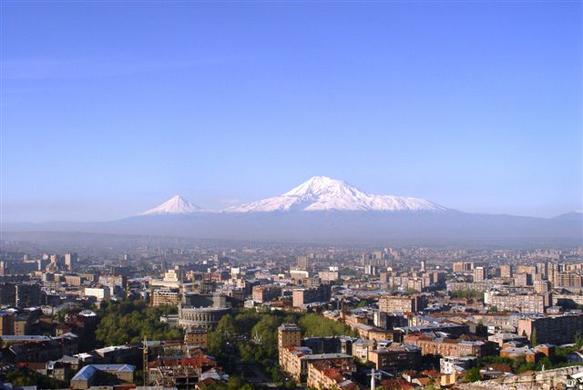Pre-election socio-political situation in Armenia is still tough

By Sabina Idayatova
Pre-election campaign in Armenia, with its scandalous progress,
not only complicates the already confused political situation, but
also causes panic among people reducing the credibility to the
upcoming elections.
The agitation campaign accompanied with the candidates' statements
over withdrawal from the presidential races, hunger strikes, and
even an armed attack on one of the candidates shows the plight of
political intolerance in Armenia.
Paruyr Hayrikyan, who was shot in the shoulder in the center of
Yerevan on January 31, was able to escape the death. Following the
attack, whose real reason is undetermined yet, first appealed to
the Armenian Constitution Court to change the date of the election
for two weeks in accordance with the Constitution.
However, later Hayrikyan withdrew his application back as he
recognized that the court is unlikely to approve his address and it
will not produce any result.
In the light of the created situation, the leader of the National
Conciliation party Aram Harutyunyan withdrew his candidacy, but
earlier went on one-day hunger strike in front of the Central
Election Committee building, to deem further rivalry for the
president's post unfounded and has no confidence in a fair conduct
of the election.
Furthermore, Harutyunyan urged all other presidential candidates
to issue statements on a joint withdrawal to leave main rival -
incumbent president and the chairman of the Armenian Republican
Party Serzh Sargsyan as the sole candidate.
"The upcoming elections can't be legitimate, while those ready to
continue the struggle legitimize the authorities," Harutyunyan
said.
Meanwhile, other presidential candidate Andreas Ghukasyan, who
announced a hunger strike near the building of the Armenian
parliament on January 21, refused to stop the strike despite ill
health. Ghukasyan stated that he will stop the hunger strike only
when Sargsyan withdraws from the presidential race or if the
European countries state that Armenia is a non-democratic country
and stop implementing their observation missions.
Furthermore, almost in all regions of the country, people complain
on collection of passport data, financial pledges, in some cases
even the pressure on voters.
Head of Heritage faction Ruben Hakobyan said that the persons
carrying out these works interested in collecting data of the
people being outside the country, and called on government to
develop effective mechanisms to prevent electoral bribery.
Opposition also complains that Armenian schools turned into a place
of agitation, where parents are blackmailed and teachers are openly
canvassing for the current president. People apprehend to address
relevant structures and report the incident.
Only the social-economic situation in Armenia has not changed on the background of the recent developments: the situation is still miserable.
Shortly before the presidential election Gallup International Association, a group of research agencies, has conducted a public opinion poll over the economic situation established in the country.
Some 35 percent of respondents evaluate the economic situation in the country as bad, whereas some 24 percent assess it as very bad.
Director of the Armenian office of Gallup International Association Aram Navasardian said only 3 percent of respondents assess the economic situation in Armenia as positive and 36 percent as average.
Navasardian added that nine percent assess their material well-being as good and only one per cent as very good. However, 60 percent consider the material wealth of the family as average, 21 percent as bad and nine percent as very bad.
"The difference between the estimates of well-being in the family and economic situation in the country is stipulated by the fact that the family does not depend only on the situation in the country, as many depend directly on private transfers," Navasardian said.
Only 10 percent of respondents are fully satisfied with life, while 21 percent are dissatisfied and 37 percent are partially satisfied.
Asked 'Will you live better or worse in a year?', 40 percent of respondents stressed they will face the same situation, while 21 percent believe it will be slightly better, and 13 percent say they expect it to be slightly worse, six per cent much worse and four percent much better. Around 17 percent failed to answer the question.
The Gallup poll was conducted among 1,080 people in Yerevan and other regions, including rural communities, on February 2-5.
Meanwhile, Presidential candidate Raffi Hovhannisyan announced that Armenia has lost 200,000 people over the past 5 years. He blamed the current and the previous governments of the boosting large-scale migration, adding that Armenia will have a new president if free, fair and transparent elections are held.
The existing deplorable economic situation forced ordinary
Armenians to leave the country. Thus, about 2.234 million people
left Armenia in 2012, while 2.191 million arrived, according to the
state migration body of the country, which has population of less
than 3.5 million.
Given the South Caucasus republic's small population, this is a
high percentage -- a dangerous demographic situation for Armenia --
and if this trend continues, the country may soon have almost no
labor force left. Around two-thirds of the migrants have reportedly
gone to Russia, while the rest have moved to the U.S. or
Europe.
It seems that, the sixth presidential elections in the history of Armenia will not gladden hopeless respondents -- ordinary Armenians. But Armenian people should not be condemned, how they can expect a fair president from unfair fabricated presidential elections?
Here we are to serve you with news right now. It does not cost much, but worth your attention.
Choose to support open, independent, quality journalism and subscribe on a monthly basis.
By subscribing to our online newspaper, you can have full digital access to all news, analysis, and much more.
You can also follow AzerNEWS on Twitter @AzerNewsAz or Facebook @AzerNewsNewspaper
Thank you!
